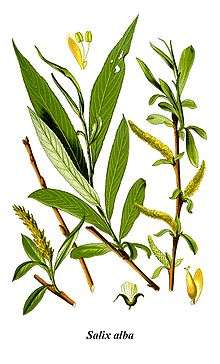Muti
Muti is a term for traditional medicine in Southern Africa as far north as Lake Tanganyika. The word muti is derived from the Zulu word for "tree," whose root is -thi. In Southern Africa, the word "muti" is in widespread use in most indigenous African languages as well as in South African English and Afrikaans, which sometimes use it as a slang word for medicine in general.[1]
Traditional medicine
African traditional medicine makes use of various natural products, many derived from trees and other plants. Botanical medicine prescribed by an inyanga or herbal healer is generally known as "muti", but the term can apply to other traditional medical formulations, including those that are zoological or mineral in composition.
Vulture brains are used for prophecy in muti.[2]
Linguistics
This noun is of the umu/imi class so the singular (tree) is umuthi and the plural (trees) is imithi. Since the pronunciation of the initial vowel of this class is unstressed, the singular is sometimes pronounced muthi. The word is rendered as muti by the historical effects of the British colonial spelling.
Colloquial use
In colloquial English and Afrikaans the word muti is often used to refer to medicines in general or medicines that have a 'miraculous' effect, e.g.
- "Die dokter het 'muti' op die seerplek gesmeer en die volgende dag was dit heeltemal gesond." (The doctor rubbed 'muti' on the wound and the next day it was completely healed.)
- "My dokter het vir my 'muti' verskaf vir my seer keel." ("My doctor gave me some 'muti' for my sore throat.")
Muti killings
Occasions of murder and mutilation associated with some traditional cultural practices in South Africa are also termed muti killings. More correctly known as medicine murder, these are not human sacrifice in a religious sense, but rather involve the murder of someone in order to excise body parts for incorporation as ingredients into medicine and concoctions used in witchcraft.
In February 2010, Deputy Provincial Commissioner William Mpembe of the South African Police Service (SAPS) in North West Province said that “muti murders, particularly those involving young children, seem to be on the rise in the Tshwane areas including Soshanguve, Garankuwa and Rietgat"[3] That same month, African traditional healers and the Gauteng government convened at a seminar in Pretoria, South Africa to root out the "evil practice of mutilating human bodies for purposes of muti making."[4]
See also
External links
- Traditional African Healing
- "Sangoma / Muti / South African Traditional Healers / South African Witchdoctors" 9 June 2009
References
- ↑ "Traditional African Healing". African Code. Retrieved 18 September 2012.
- ↑ http://ngm.nationalgeographic.com/2016/01/vultures-text
- ↑ "Cash for organs is no joke". http://www.sowetanlive.co.za. Sowetan Live and SAPA. 25 February 2011. Retrieved 3 July 2012. External link in
|work=(help) - ↑ SAPA (19 February 2010). "Muti killings to be tackled". http://www.news24.com. News24. Retrieved 3 July 2012. External link in
|work=(help)
